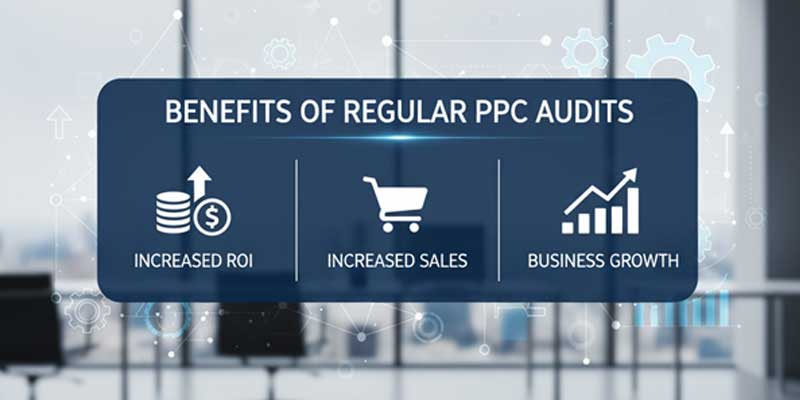

In today's digital front age, Pay-Per-Click (PPC) advertising is important for companies who want to create leads, drive traffic, and increase sales. Google Ads, Microsoft Ads, and social media platforms enable businesses to target audiences and track campaign results in real time.
But even the best-designed PPC campaigns face difficulties. Costs escalate, conversions differ, without any clear picture. That's where routine PPC audits enter the scene. By systematically and regularly reviewing your PPC accounts, you can maximize performance, minimize waste, and bring your campaigns in line with overall business goals.
In this blog, we’ll break down what PPC audits are, explore their key benefits, and explain why they’re essential for sustainable business growth.
A PPC audits are a complete analysis of your pay-per-click ad campaigns.
It includes looking at all aspects of your account campaign organization and keyword strategy through to ad performance and conversion tracking to see what's doing well and what needs to change.
Consider PPC auditslike a check-up for your advertising health.
Just as you would not overlook symptoms of a physical condition, you would not overlook symptoms of poorly performing PPC.
No matter whether you have an in-house or agency PPC team, an audit gives a data-driven solution to expose inefficiencies, untapped opportunities, and strategic misalignments.
A comprehensive PPC audits will usually examine the following factors:
Running a PPC campaign without regular PPC audits is like sailing without a compass you might move, but you’ll have no idea if you’re heading in the right direction.
Here’s why PPC audits are so beneficial:
Each dollar you spend on PPC should be working towards your business goals.
Audits enable you to identify keywords that are underperforming, untargeted traffic sources, or costly placements.
By shifting spend to high-performing segments, you can improve your ROI and lower cost per acquisition (CPA).
Accounts left unmandated for months tend to contain waste.
Examples are:
Regularly cleaning house through a regular audit keeps your money from being wasted on non-converting clicks.
One of the most significant problems found in audits is a misalignment between the ad and the landing page.
If a user clicks an ad anticipating a certain offer or product and ends up on a generic homepage, they're probably going to bounce.
Audits assist in maintaining messaging continuity and funnel coherence, leading to improved user experience and increased conversions.
Google provides a Quality Score for every keyword based on predicted CTR, ad relevance, and landing page quality.
The higher the quality scores, the lower the cost-per-clicks and the superior ad positions.
Audits can help find low-quality score zones and recommend actionable enhancements.
Without accurately tracking conversions and assigning sales to the appropriate campaigns, you can't make sound decisions.
Audits confirm your tracking configuration, so you know that the data you're counting on is correct and actionable.

Audits aren’t just about fixing mistakes, they're about positioning your business for long-term growth.
Here’s how regular audits contribute directly to business expansion:
PPC audits aren't simply about correcting errors, they're about preparing your business for long-term expansion.
Here's how ongoing audits directly aid in business growth:
Search engines continually update their algorithms, add new features, and alter ad formats.
Consumer behavior also evolves over time.
A campaign that succeeded the last quarter can now fail due to algorithm updates or consumer fatigue.
By not performing regular audits, you lose out on
Staying ahead requires staying up to date.
You can't scale your way to growth before making sure existing campaigns are optimized.
Scaling underperforming campaigns merely magnifies waste.
Auditing guarantees your foundation is solid prior to scaling efforts.
Marketing budgets tend to be low.
Audits on a regular basis enable you to ascertain what's yielding the highest ROI so that you focus on those campaigns.
You might learn that some campaigns have reached diminishing returns, triggering the need for redistribution.
Your business goals may change throughout the year.
Maybe you’re focusing on lead generation in Q1 and product sales in Q4.
PPC strategies need to evolve with these changes.
Regular audits ensure your campaigns remain aligned with your overall objectives.
Your competitors are always optimizing their campaigns.
If you're not constantly reviewing and refining your PPC campaigns, you'll be left behind.
Audits keep you ahead by finding opportunities that they might not have seen.
The audit frequency varies based on various factors such as budget size, campaign complexity, and the level of competition in the industry.
As a general guideline:
Key events product launches, seasonal promotions, or website redesigns also call for urgent audits to align and ensure correct tracking.
There are a number of choices based on your budget:
If your marketing department has PPC knowledge, they can perform internal audits.
The advantage here is a deep brand understanding, although internal bias might result in missed opportunity.
Agencies provide industry knowledge, tools, and benchmarks.
An outside view often generates insights internal teams may not catch.
If you are looking for an objective professional viewpoint but do not necessarily need a long-term relationship, a freelancer or consultant can perform a one-time audit or ongoing service.
Whomever carries out the audit, will have to be adequately conversant both in business strategy and in PPC operations.
The following are some common issues found in audits:
Correcting only a few of these can have an instant positive effect

PPC audits while running campaigns can be huge growth drivers if they're properly managed and consistently optimized.
Ongoing audits serve as a diagnostic tool that keeps your ad engine finely tuned.
They help you discover waste, get more out of the resources you have, find new opportunities, and make sure your marketing strategy is driving results toward business objectives.
In a competitive online environment where other PPC Company in Manchester and countries all over the worldspend for clicks and gaining better results, you can't afford to have your PPC campaigns running on autopilot.
Don't leave audits as not optional, but as critical milestones in your growth plan.
Take the time or money and audit your PPC efforts, and you'll be rewarded with improved performance, wiser spend, and more sustainable growth.